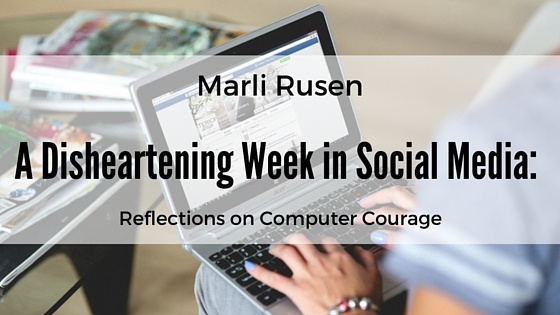Resources > Blog > A Disheartening Week in Social Media: Reflections on Computer Courage

Much of my work on workplace respect focuses on the “how” of communication – how we speak to each other, how we speak about each other and how we treat each other as human beings, regardless of our position on the organizational chart, seniority list or otherwise.
Critical feedback, dissolution of employment contracts, intense interpersonal disagreements and hotly litigated disputes all can co-exist with respect, provided that we communicate to and about each other with civility and consideration.
Regrettably, social media, including Facebook, Twitter and the internet generally, can bring out the worst in people. For some reason, when some individuals sit down in front of their computer screens, or type on their phones, they seem to think that respect for others’ dignity becomes irrelevant. The only thing that seems to matter is their hurt feelings or intense disagreement with someone else’s opinion. On this basis alone, they feel entitled to personally attack, threaten, shame and defame the other person, all in the name of being “right”.
This behaviour worsens when individuals are permitted to personally attack others publicly on an anonymous basis. In the absence of personal responsibility or accountability for their words, “computer courage” kicks in, and the anonymous person kicks the publicly identified person to the ground, often in a horrifically shaming and belittling manner.
Two stories this week show how intensely damaging the internet can be, and has become, when individuals conflate the right to express their opinions with the right to personally damage and threaten others’ dignity, respect and personal security.
In Abbotsford, BC, a woman was ordered to pay a teacher over $65,000 in damages for “making unfounded accusations on Facebook suggesting her neighbour was a pedophile who set up mirrors and cameras in his backyard to spy on her children.” Find Article Here. The comment was made in the context of a noise complaint between neighbours.
In the U.S., two female sports broadcasters engaged in a videotaped experiment in which men randomly read out “mean tweets” these women had received on Twitter from other men who didn’t know and had never met them. Find Article Here. The tweets included threatening and degrading comments such as “I hope you get raped again”. The men who were forced to read the tweets aloud became visibly emotional and at times asked if they “had” to finish the task.
Despite having personally experienced and professionally investigated significant bullying and harassment via social media, I found it incredibly haunting and difficult to watch as these men struggled to verbalize the incredibly harmful and misogynist messages that were scribed by other men, to these women, on an almost daily basis.
These two stories reflect a number of important take-aways:
First, it is not always men who are the perpetrators of on-line disrespect and women who are the victims. In the Abbotsford case, the woman caused intense personal damage to the man, and in the second, a number of men caused intense personal damage to the women.
Second, the mere fact that some men engage in intense disrespect towards women on social media does not mean that all men are misogynistic or support the men who are engaging in this behaviour. The men who participated in this experiment were clearly and adversely affected by the experience of having to read these damaging messages to women, even when they had not created the messages and even knowing they were part of an “experiment” of sorts.
No one group has a monopoly on social media (or otherwise) when it comes to abuse, disrespect, bullying and harassment. Women and men, of various ages, religions, educational levels and cultural backgrounds, have demonstrated a clear ability to be intolerant of opposing viewpoints, insensitive to others’ feelings, and disrespectful towards their perceived adversaries, in order to gain power, maintain control or enhance their position within a particular organization or field.
Simply put, personal attacks on or off the internet are about human beings treating other human beings in a completely unacceptable and intolerable manner. It needs to be called out. It needs to end. There is simply no excuse for this inexcusable behaviour. Let’s be clear. This has nothing to do with freedom of expression. This is all and only about indefensible mean behaviour by certain individuals towards others, which has no proper place in any constructive debate or disagreement, on-line, in the workplace or otherwise.
Feel free to disagree with referees over their calls, with journalists over their opinions and with adjudicators over their findings. Engage in political or legal battles with your personal or professional adversaries as necessary. But please take the high road and do so with respect.
Let’s each do what we can to end these highly damaging and distressing personal attacks – one post, one tweet and one conversation at a time.
– Marli Rusen
